 Aphrodite (Venus) Greek Goddess - Art Picture by KamillYonsiya
Aphrodite (Venus) Greek Goddess - Art Picture by KamillYonsiyaAphrodite (Roman equivalent is Venus) is the Greek Olympian goddess of love, beauty, pleasure, and procreation. It would be impossible for the Greeks, a people who so loved the natural beauty and pulchritude, not to invent a deity who protects and personifies those values. For this reason, Aphrodite was symbolizing the eternal beauty and sexual desire.
The most prevalent myth about her origin is that she was born on a coast of Cyprus. From there the wind Zephyrus with a gentle gust pushed her to the sea, into the white-crested waves. Aphrodite was greeted by the Ores (the seasons), that dressed and adorned her. She wore inlaid, floral dresses from purple, silk and other shiny fabrics. They plaited her rich braided hair and pinned them with a beautiful, golden buckle. They adorned her glowing white neck with precious necklaces, emeralds and rubies. Finally, they wore pearl earrings to her ears. Then they transferred Aphrodite to Olympus and presented her to Zeus and the other gods. Everyone admired her, were dazzled by her beauty, told her countless compliments and wanted to make her their wife.
 Aphrodite (Venus) Greek Goddess - Art Picture by jjlovely
Aphrodite (Venus) Greek Goddess - Art Picture by jjlovely
Hesiod in his Theogony presents us a different version. Aphrodite was born from the members of Uranus after his amputation by Cronus. The sea kept for very long the celestial members inside her infinite body. Foam formed around them and through the foam the gorgeous Aphrodite emerged. Zephyr travelled her, upon a huge seashell, for a long time in the immense Ocean. During this journey, the strange ship of Aphrodite passed through Kythera and then went to Cyprus.
The beautiful goddess descended on the island and everywhere she stepped, colorful and fragrant flowers were sprouted. From the places the goddess of beauty traveled, after her birth, she was named Kythireia and Cypriot. Moreover, the name Aphrodite indicates her birth from the sea foam (Aphros in Greek Language is foam). About her birth, we should also note here the version of Homer, who informs us that she is the daughter of Zeus and Dione (she was an Oceanid).
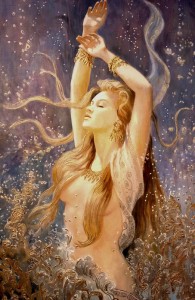 Aphrodite (Venus) Greek Goddess underwater - Art Picture
Aphrodite (Venus) Greek Goddess underwater - Art Picture
There are too many myths showing the gorgeous goddess having always as weapons her seductive beauty and her irresistible sexual desire. Initially, we meet her fighting the Giants alongside the Olympians. With her incomparable charms, Aphrodite lured fifteen Giants into a cave where Heracles (Hercules) was hidden. Heracles then exterminated them one by one with great ease.
Aphrodite with her sweet cravings could conquer all the gods and mortals but also the beasts of the land and the sea, she exercised great power in the entire universe. Her greatest amusement was to seize the gods with erotic lust for mortal women and goddesses for mortal men.
Once her purpose was fulfilled, she started mocking the Olympians who accepted to mate with lesser beings. The only ones that could not fool over at Olympus were the goddesses of eternal virginity, Athena, Artemis and Hestia. Aphrodite’s largest victim was Zeus, whom she often threw into the arms of one or other of mortals thus causing the uncontrollable hatred of Hera. Of course, she always tried for the naughty actions of Zeus not to arrive at his wife’s ears.
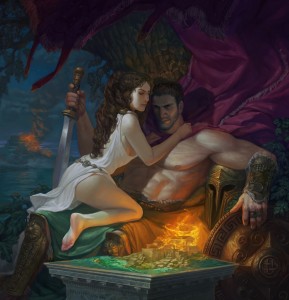 Aphrodite (Venus) and Ares (Mars) - Art Picture by hellstern
Aphrodite (Venus) and Ares (Mars) - Art Picture by hellstern
Aphrodite is the lawful wife of Hephaestus. Unfortunately, the ugly and cripple god did not manage to keep for long the most beautiful goddess his own, who started cheating on him with Ares. Other myths are told that it was the lawful wife of Mars and from their relationship she had four sons: Imeros (Lust) and Eros (Love) were the permanent winged attendants of Aphrodite. Deimos (Terror) and Phobos (Fear), on the other hand, were the inseparable warlike followers of the God of War. In accompaniment of Aphrodite also attended Hebe, Harmony, Times, Persuasion and Graces.
They say that Aphrodite paired also with other immortals. So, she mated with Poseidon and had with him a son, Eryka, the hero who gave his name to a mountain of Sicily. The daughter born from their divine intercourse was Rhodes. Also, the goddess of eternal beauty joined with mischievous Dionysus. Hera, in order to avenge Aphrodite that constantly lured Jupiter in extramarital relations, when she was pregnant by Dionysus, rubbed her belly with a magic wand. So the goddess gave birth to the ugly and shameless god of fertility, Priapos. From her relationship with Hermes, a son was born and since he looked very much to both of his heavenly parents, they named him Hermaphroditus.
 Aphrodite (Venus) Greek Goddess - Art Picture by Isikol
Aphrodite (Venus) Greek Goddess - Art Picture by Isikol
He was brought up by the nymphs of Ida and when he grew up he became a very handsome man. He once traveled to Caria and came to a lake where the water was so clear that he could clearly see the bottom. The Nymph of the lake, the beautiful Salmakida, just after she saw the Hermaphrodite, fell madly in love with him. After she was dressed and adorned, she appeared in all her glory to the divine man and asked him to mate with her. But he resisted and rejected the nymph’s proposal.
When the young man thought he was alone, he took his clothes off and plunged into the clear waters of the lake. The nymph, hidden beside the lake, was stalking him and was unable to resist at the sight of his naked body. She lunged into the water and started hugging and kissing the young man. He resisted, but the nymph squeezed him with all her strength, prayed to Zeus and asked him never to be split from her lover. Zeus heard her prayer and joined the two bodies into one. The Nymph and Hermaphroditus since then form a face and a body that is simultaneously male and female.
 Aphrodite (Venus) Greek Goddess - Art Picture by jdm
Aphrodite (Venus) Greek Goddess - Art Picture by jdm
Zeus wanted to punish Aphrodite because she was constantly using her erotic passion in order to keep ruling on the immortals. She was luring the gods through romances with mortals and then laughed at them and made them blush with shame. So Zeus decided to throw herself into the arms of a mortal. Since he was omnipotent, he succeeded to cause her sexual desire for Anchises, a young shepherd on the Ida, whose beauty and bravery was exceptional. When Aphrodite felt the irresistible attraction to the young shepherd, she immediately ran to the temple of Paphos. There she called the Graces and after closing tightly the huge gates of the temple, she began to groom and adorn herself with their help. The Graces bathed her with perfumes and milk.
After that, they nursed her face and her body with cosmetics and magic creams and made it sparkle even more. Graces dressed her in gossamer dresses and various cloths and embellished her with delicate jewels, made from the rarest gems of the sea. In the end, Aphrodite tied in her waist the godly band that was sealing the desires and loves and flew to Mount Ida. When she reached a clearing of the mountain, she transformed into a mortal princess to fool Anchises. Then she headed to his hut. On the way he met wild beasts that rushed to devour her. Immediately the goddess untied her magic belt and that menacing lions and wild tigers began to wag their tails amicably and lick the goddess. After the wild beasts were charmed, they began to form couples and vanish to the forest to mate.
 Aphrodite (Venus) Greek Goddess - Art Picture by Valiant
Aphrodite (Venus) Greek Goddess - Art Picture by Valiant
When she reached Anchise’s hut, the mortal shepherd was dazzled by her beauty and realized that she was probably a goddess. Aphrodite, however, convinced him that she was the mortal daughter of the king Otreas of Phrygia and she was brought by the swift-footed Hermes to mate with him. Anchises could no longer resist the erotic passion that was conquering him and mated with the goddess in his hut’s bed.
After he fell asleep, Aphrodite took her real form. When Anchises woke up and saw the head of the goddess reaching the roof of the hut, he got very scared and called for her mercy. Aphrodite revealed that all that happened was the will of Zeus. She also said that she would give him a son, Aeneas, who would himself become glorious and leave illustrious offspring. But he had to divulge his relationship with her and had to say that he obtained his son from a nymph of Ida, otherwise Zeus would strike him with lightning.
 Aphrodite (Venus) Greek Goddess under moonlight - Art Picture
Aphrodite (Venus) Greek Goddess under moonlight - Art Picture
Well known also is the love of Aphrodite for Adonis, the most beautiful young man of the world. The story begins a long time ago. A princess of Syria, Myrra, was boasting that she was more beautiful than Aphrodite. The goddess, enraged, caused Myrra an unholy love for her father, managed to fool him and joined him for twelve nights. When she recovered from the temporary madness that Aphrodite had sent to her, she realized the deadly sin and ran into the woods to hide. The goddess finally took pity of her and transformed her into a tree, the known Myrsine. Later the bark of the tree popped and a child was born, named Adonis.
Aphrodite was thrilled by the beauty of the infant and decided to protect it, giving it to Persephone, wife of Hades, to raise him in the dark kingdom. But when Adonis grew up and became a beautiful man with a very nice body and divine aspect, Persephone, bewitched by his beauty, fell in love with him and refused to give him back to Aphrodite. The goddesses began arguing and fighting, but none could prevail. So they ran to the all-wise Zeus to solve their dispute.
 Aphrodite (Venus) Greek Goddess - Art Picture by lilok lilok
Aphrodite (Venus) Greek Goddess - Art Picture by lilok lilok
Zeus decided that Adonis would spend the one third of the time next to Aphrodite, the second third next to Persephone and the remaining third everywhere he wanted to. So, after Zeus’s decision, he always lived four months in the underworld with Persephone and eight months on earth with Aphrodite. Whenever the time came for him to leave Hades and to climb over the earth, the whole nature welcomed him with joy. The fields turned green, flowers and trees blossomed and a wonderful aroma flooded the atmosphere. Aphrodite was abandoning her divine palace on Mount Olympus and lived with her young lover in the mountains and forests.
But this fact caused the wrath of Ares, who was jealous of Adonis. So, one day he sent a wild boar which with its tusks mortally wounded the young man. They say that once the goddess ran to help her injured friend, she stepped on a thorn and from the blood that flowed, a rose was painted red. Until then there were only white roses.
Another version tells that the goddess shed so many tear drops as many were the drops of blood that flowed from the wound of Adonis. From every tear a rose was born, while from every drop of blood grew an anemone.
 Aphrodite (Venus) Greek Goddess - Art Picture by LinzArcher
Aphrodite (Venus) Greek Goddess - Art Picture by LinzArcher
The anger and curses of the goddess were infamous and her victims were many. So when Dawn (Io) mated with Ares, Aphrodite was enraged. To take revenge of her, she inspired Dawn a fierce love for the giant Orion. Dawn, flowing with erotic passion, kidnapped the beautiful giant and led him to Delos. But her desire could not be satisfied in any way, because she was doomed by Aphrodite to live eternally in love.
Additionally, the goddess avenged with fierce way the women of Lemnos who forgot to honor her. She sent them an intolerable smell, so no men would like to approach them. The men chose to mate with some women prisoners from Thrace. The women of Lemnos, in order to avenge them, killed them all and founded a society of women. Much later, the Argonauts arrived at Lemnos and gave sons to women, resuming the normal life on the island.
 Aphrodite (Venus) Greek Goddess - Art Picture by zeoxisace71
Aphrodite (Venus) Greek Goddess - Art Picture by zeoxisace71
Aphrodite wanted to retaliate in any way Helios (Sun), who had revealed her infidelities to Hephaestus. But because she could not harm the almighty god, he turned against his daughter and granddaughters. First victim was Pasiphae, wife of Minos of Crete. The goddess conquered her with an unholy passion for a bull. To manage this absurd pairing, the daughter of Helios used the effigy of a heifer. Fruit of this union was Minotaur. Many years later, it was the turn of the daughters of Pasiphae and Minos. When Theseus came to fight with the Minotaur in the Labyrinth, Ariadne helped him with the magical clew (ball), after Aphrodite had inspired her fierce love for the prince of Athens. So, she betrayed her father for the sake of her lover, who eventually abandoned her.
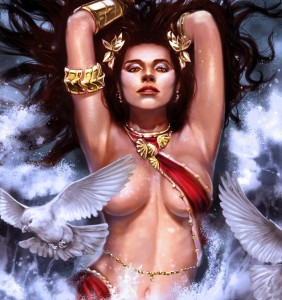 Aphrodite (Venus) Greek Goddess - Art Picture by laclillac
Aphrodite (Venus) Greek Goddess - Art Picture by laclillac
The destructive wrath of the goddess also hit Phaedra, sister of Ariadne. Initially she was enraged with Hippolytus, son of Theseus and an amazon, because he despised her, preferring Artemis. Then Aphrodite sent an overwhelming sexual desire in Phaedra, the second wife of Theseus, for her progenitor (the child of her husband), who resisted the love of his stepmother. Phaedra, in order to avenge him, told her husband that Hippolytus tried to rape her. This story ends with the death of Hippolytus and Phaedra.
The goddess of course punishes her deniers, but also protects her friends. Many myths have Aphrodite help mortals who were victims of sexual passion or had won her sympathy with a kind action.
 Aphrodite (Venus) Greek Goddess under sunlight - Art Picture
Aphrodite (Venus) Greek Goddess under sunlight - Art Picture
For example, a shepherd, Selemnos with his beauty and gallantry managed to conquer the Nymph Silver. They lived together for years, but as he grew old, his beauty vanished. His eternally young and beautiful bride also abandoned him. Selemnos died of sorrow. Aphrodite was touched by his erotic drama and transformed him into a river. But Selemnos was still sad and tormented by his passion. The goddess intervened for a second time and gave him the gift of forgetfulness. Since then, all the young people who were bathing in the waters of Selemnou forgot their erotic torment.
 Aphrodite (Venus) Greek Goddess - Art Picture by nataly1st
Aphrodite (Venus) Greek Goddess - Art Picture by nataly1st
There is also a myth in Lesvos, according to which, a boatman named Phaon, accepted a request by the goddess freely pass an old lady on the opposite shore. Aphrodite personally transformed into an old woman to determine the obedience of the poor boatman. In order to reward him, she gave him a magic potion. Phaon used it and immediately became the most handsome man of Mytilene, causing the love of all women.
In another case, Aphrodite advised a merchant from Samos, Dexikreontas, to fully load his ship only with drinking water and sail immediately. The merchant obeyed her divine advice. When they were in the open sea, the winds stopped blowing and all sailing ships were immobilized for several days. Soon they were running out of drinking water and Dexikreontas acquired a fortune by selling the large stock he had in his boat. When the winds started to blow again and he reached ashore, he dedicated a bright statue in Aphrodite.
 Aphrodite (Venus) Greek Goddess at sea - Art Picture
Aphrodite (Venus) Greek Goddess at sea - Art Picture
Once, Atalanta, a princess of Boeotia, because she did not want to marry, was putting all the candidate grooms that asked to marry her, to a test. More specifically, Atalanta was inviting the aspiring grooms to a race, giving them even the opportunity to start running first. Then rushing forward, she was reaching and killing them. Melanippos while knowing the tactics followed by the princess, motivated by Aphrodite, accepted to take the test. The goddess had given him many golden apples from the garden of the Hesperides. Each time the young man saw Atalanta approaching him, he threw an apple to the ground and she was stopping to pick it up. With this trick he managed to end first in the race and marry the rebellious girl.
 Aphrodite (Venus) Greek Goddess - Art Picture by crashdowngrrl
Aphrodite (Venus) Greek Goddess - Art Picture by crashdowngrrl
Very important also is the participation of Aphrodite in the most famous and renowned battles of antiquity. Particularly in the Trojan War, we can say that the goddess was the reason that the decade-long war started. It all started when Athena, Hera and Aphrodite claimed the title of most beautiful goddess. Zeus then appointed Paris, the prince of Troy, as judge who was tending his father's sheep on Mount Ida. In this peculiar beauty contest, Paris gave the title to the goddess of beauty and she in return gave him the most beautiful woman in the world, Helen, wife of King Menelaus of Sparta. Paris traveled with ships to Sparta and was hosted at the palace. Then Aphrodite conquered Helen with an overwhelming sexual desire for Paris. This resulted in the beautiful princess to follow, like hypnotized, her guest to Troy. The abduction of Helen was the cause for the outbreak of war.
Aphrodite participated in the war always supporting the Trojans, since Paris, her official protégé, was Trojan. But Aeneas also was Trojan, the son she gained from her mate with Anchises. The goddess intervened at crucial moments. Most important was her involvement in the duel of Paris and Menelaus.
 Aphrodite Rising from the sea - Art Picture by TheArtistDarklady
Aphrodite Rising from the sea - Art Picture by TheArtistDarklady
The two sides had agreed that Helen would be delivered into the hands of the winner of the duel. The moment that Menelaus would be victorious, Aphrodite suddenly appeared into a cloud, grabbed Paris and took him to the Trojan palace. Additionally, conquering Helen again with sexual desire, threw her in his arms, although she actually wanted to return to her lawful husband.
Moreover, Aphrodite intervened many times in the battle to protect Aeneas, who was the bravest Trojan warrior after Hector. When the Greeks succeeded in conquering Ilium (Troy), he with the help of his mother goddess, took his family, several companions and with their ships went to Italy and founded Rome.
The role of Aphrodite in the Argonauts was decisive. With her intervention, Medea, the princess of Colchis, fell in love with Jason. To help him complete all the hard labours, that her father was putting, she built a magic ointment and gave it to Jason. With this ointment, Jason become fearless and grabbed the golden skin. Medea followed her lover in Greece.
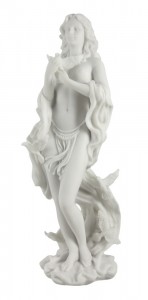 Greek Goddess Aphrodite (Venus) Statue
Greek Goddess Aphrodite (Venus) Statue
There was intervention of the goddess at other times also in their campaign. When the Argonauts passed through the island of the Sirens, Orpheus saved them playing the lyre. Only Voutis, a very brave lad, managed to resist the allure of the Sirens and dived into the sea to reach their island. The moment he was approaching, the charming singers were ready to kill him. Aphrodite saved him by grabbing him and carrying him on a promontory of Sicily.
The beautiful goddess, except patroness of sensual and extramarital sex, sometimes was shown as protector of legitimate associations. A typical example is her participation in the upbringing of Pandareou’s orphan maidens. Aphrodite had undertaken to nourish them with milk, sweet honey and exquisite wine. When the girls reached the age of marriage, Aphrodite ascended to Olympus and asked from Zeus the appropriate grooms for the young women, in order to each have a happy marriage. But during her absence the Harpies snatched the girls and gave them as attendants on Erinyes.
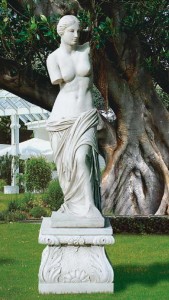 Greek Goddess Aphrodite (Venus) Statue (Aphrodite of Milos)
Greek Goddess Aphrodite (Venus) Statue (Aphrodite of Milos)
Moreover, the protector of the legitimate marriage herself, Hera, when she wanted to seduce her unstable husband, asked the help of Aphrodite. Without a trace of shame, Hera was asking Aphrodite to lend her the magic girdle which contained the loves, tender caresses, desires and sweet talks.
Aphrodite was also a sea goddess. That is stated by the myths about her birth and her endless adventures on the Greek islands. Moreover, the stories of Phaon and Dexikreontas show that she protected the sailors. Furthermore, the statue of Emerging Aphrodite graced most ports in antiquity.
Aphrodite was more a goddess of beauty and sensual love and rarely protected the marital life. Sanctuaries symbols were the white doves. Additionally, a pair of these birds dragged her chariot. Other symbols were apple, poppy, rose, myrtle, anemone and the flower of pomegranate.
Please leave a comment if you liked this article 🙂
All pictures are also uploaded in Albums on the Greek Mythology Pantheon page on Facebook, visit us at :


11 COMMENTS
Hi. I’m looking for the website/link to the artist JDM who did that pretty Aphrodite with white flowing hair and dress, holding up the white orb with the violet background. I would appreciate any and all help pls. Thanks!
I will try to track it and see where I found the image, but the “JDM” is for sure due to the fact that it is embedded to the original picture.
I don’t think the artist was JDM.
Here’s a link to a 2008 version of the picture (http://www.nch.com.tw/Image/novel/12986-4b.jpg) …and website where it is (http://www.nch.com.tw/novel_all.php?nid=12986&class_id=46443)
The pic didn’t have the “JDM” initials back then. Someone other than the artist probably added the “JDM” initials.
Note that this site has many pics of women, so it’s possible the picture is not necessarily that of Aphrodite.
Finally, this site is from Taiwan. Don’t know if that helps.
love it
I love the pictures of Venus and the text was very helpful.
the pics were weird but we got some info
Hello, Does anybody know who the originator of ‘Aphrodite (Venus) Greek Goddess underwater’ is shown on this site? I am desperately searching for that… Any input you may have is highly appreciated!
i love the pictures and all this information and by the way can you tell me where you got the hot and sexy pics of Aphrodite because i just fell in love if you can do that that would be great thank you
great pictures
it was creepy with the pictures but helpful with the text
Thanks so much for the detailed account of the Aphrodite mythology Lefteris,
I’ve got to admit that I only really knew (a little) about Aphrodite and Zeus – it was great that you included info about Heracles, Adonis, Eros, Imeros, Deios, Phobos and others! I do, however, know quite a bit about the history of beauty and style during the actual Ancient Greek era. In case you want to learn about the documented history of the makeup and style of the ancient Greeks, we recently posted a piece exploring the research here:
https://makeupscholar.com/greek-goddess-makeup/
Thanks again for the detailed insight into Greek Mythology – this is fascinating!
Laura.